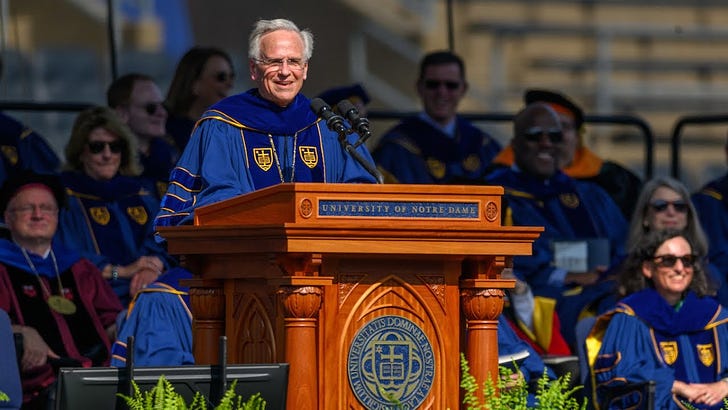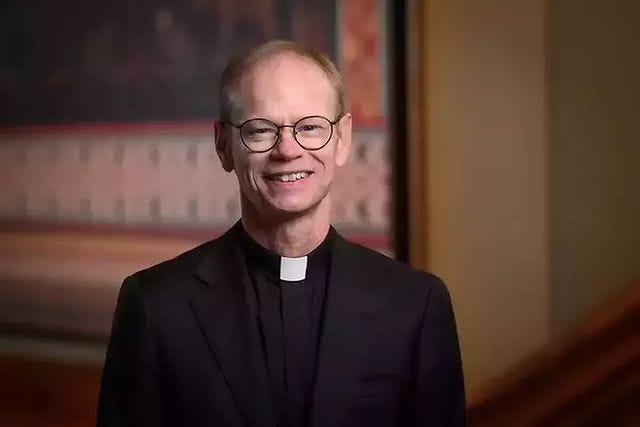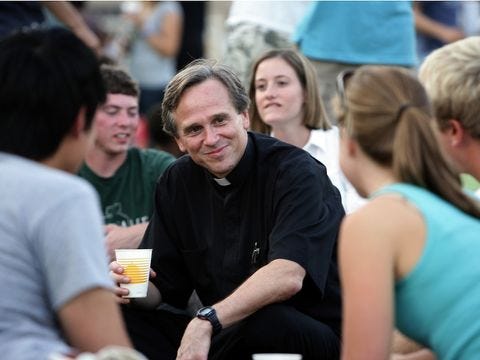Greetings, fellow Fighting Irish!
As the summer sun warms our campus, we find ourselves at the dawn of a new era. On this first week of June 2024, we welcome Father Bob Dowd, C.S.C., as the 18th president of our beloved University of Notre Dame. A new leader with perhaps a new vision for leading our cherished alma mater.
Father Bob, a native of Michigan City, Indiana, graduated from Notre Dame in 1987 with degrees in psychology and economics. He then pursued a Master of Divinity from the Jesuit School of Theology at Berkeley in 1993, followed by a Master of Arts and a Ph.D. in political science from UCLA in 1998 and 2003, respectively.
Dowd’s journey has taken him from the halls of our campus to the far reaches of the globe from serving in the Congregation of Holy Cross's missions in East Africa, to being priest in residence at St. Edward’s Hall during my two years as an undergraduate on campus.
As we turn the page to this new chapter, we can't help but wonder what Father Dowd has in store for us. While his specific agenda remains somewhat shrouded in mystery, his scholarship has focused largely on Africa, and his book has been praised for its groundbreaking insights. Could this signal a renewed focus on global engagement and social justice initiatives?
Father Dowd inherits a university that has seen remarkable growth under the leadership of his predecessor, Father John Jenkins. For the last 19 years, the university and its multibillion-dollar endowment have expanded, thanks to a development plan overseen by Father Jenkins. As a political scientist, Father Dowd's expertise may lead to a renewed effort to impact public policy in Washington, D.C., and globally.
The transition from a philosophy professor (Jenkins) in the president's chair to a political scientist (Bob) is a fascinating one. It could mean a greater emphasis on the practical application of our Catholic mission, engaging with the world's most pressing issues through the lens of political science. This shift could also lead to a deeper exploration of the role of the university in shaping public policy and influencing political discourse.
As we embark on this new journey with Father Dowd, we can't help but feel a sense of excitement and anticipation. What will the next year bring? Only time will tell, but one thing is certain: the Fighting Irish spirit is alive and well, and we are ready to face the future with courage, curiosity, and a touch of humor.
Pablo Manriquez ‘06
Editor, Irish Monthly
Donnelly Abruptly Resigns as Vatican Ambassador, Returns to South Bend
The Tablet reports that former U.S. Senator Joe Donnelly ‘77 ‘81 JD decided to step down as the U.S. Ambassador to the Vatican to return to his home state of Indiana. He expressed that it had been an honor and a privilege to serve his country in this unique capacity. Donnelly did not explicitly state the reasons for his resignation in the information provided, but it's mentioned that he will be moving back to Indiana a few miles northeast of South Bend. In April, Donnelly attended a dinner with Fathers John and Bob in the Senate —
The Observer’s Excellent Coverage of Pro-Palestine Protests
The Observer did a great job covering the protests on campus over Israel’s war in Palestine. News Editor Liam Kelly told NPR that things escalated somewhat “when the university was holding a celebration for outgoing President Father John Jenkins. Students organized a protest that evening, attempted to set up tents out on the quad twice, but were stopped by police. And no arrests have been made, and the encampments have since disappeared.”
Father Jenkins Delivers Humble Farewell Address
Father John gave the commencement address to the class of 2024. He emphasized the tenacity and grit of the graduating class, encouraging them to be proud of their achievements. He also touched on the seductive nature of hatred and that not vilifying opponents can be a sign of moral superiority. He expressed his belief in the graduates and his hope for their future, noting that no one, aside from their parents, believes in them more, prays for them more, or is more hopeful for their future. He also reflected on his time as president, sharing his experiences and lessons learned over his 19-year tenure. Watch the full speech on YouTube —
Centennial of Student Brawl With Klansmen
A century ago, in 1924, the University of Notre Dame students faced off against the Ku Klux Klan in a clash that would become a defining moment for both the university and the state of Indiana. The Klan, at the height of its power, had planned a rally in South Bend, a city known for its significant Catholic and Jewish populations. The students, not ones to back down from a challenge, decided to confront the Klan directly.
This wasn't a mere skirmish; it was a three-day brawl that saw students and Klan members clashing in the streets. The students, showing their fighting spirit, used everything from fists to potatoes as weapons. This event is often cited as the origin of the term "Fighting Irish," which has become a symbol of Notre Dame's unyielding spirit and determination.
The aftermath of this confrontation saw a significant shift in the Klan's influence. The conviction of the Klan's Indiana leader, D.C. Stephenson, for a brutal rape and murder, led to the organization's rapid decline. The incident also highlighted the resistance against hatred and discrimination by everyday people.
The story of Notre Dame students standing up to the Klan is not just a tale of a physical confrontation. It's a testament to the power of unity and resistance against bigotry and hatred. It's a reminder that even in the face of adversity, standing up for what's right can make a significant impact.
Book Recommendation: “Notre Dame vs. The Klan” by Todd Tucker
Thanks for Subscribing!
That’s it for this month’s Irish Monthly. It’s been humbling to see so many Notre Dame alums, students, and workers subscribe to this newsletter. As we continue to find our legs as a monthly publication, please let us know what you’d like to read here by emailing us at editor@irishmonthly.com.
Editor’s Note: Rather than send these on the first of every month, we’re going to start sending them on the first week of every month. This gives us a bit more flexibility in our publishing process. Thanks for understanding.






